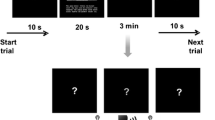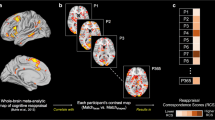Abstract
Cognitive reappraisal of emotion is strongly related to long-term mental health. Therefore, the exploration of underlying cognitive and neural mechanisms has become an essential focus of research. Considering that reappraisal and executive functions rely on a similar brain network, the question arises whether behavioral differences in executive functions modulate neural activity during reappraisal. Using functional neuroimaging, the present study aimed to analyze the role of working memory capacity (WMC) and cognitive flexibility in brain activity during down-regulation of negative emotions by reappraisal in N = 20 healthy participants. Results suggests that WMC and cognitive flexibility were negatively correlated with prefrontal activity during reappraisal condition. Here, results also revealed a negative correlation between cognitive flexibility and amygdala activation. These findings provide first hints that (1) individuals with lower WMC and lower cognitive flexibility might need more higher-order cognitive neural resources in order to down-regulate negative emotions and (2) cognitive flexibility relates to emotional reactivity during reappraisal.


modified from Ochsner et al. 2004). Each trial began with the instruction presented for 4 s. Then participants had to either look at or down-regulate the IAPS picture that emerged for 6 s according to the previous instruction. Afterwards, they rated emotional arousal and valence for 5 s each. Then participants relaxed (6–9 s) and the next trial started





Similar content being viewed by others
References
Aldao, A., & Nolen-Hoeksema, S. (2012). When are adaptive strategies most predictive of psychopathology? Journal of Abnormal Psychology, 121(1), 276–281. https://doi.org/10.1037/a0023598.
Aldao, A., Nolen-Hoeksema, S., & Schweizer, S. (2010). Emotion-regulation strategies across psychopathology: A meta-analytic review. Clinical Psychology Review, 30(2), 217–237. https://doi.org/10.1016/j.cpr.2009.11.004.
Armbruster, D. J., Ueltzhoffer, K., Basten, U., & Fiebach, C. J. (2012). Prefrontal cortical mechanisms underlying individual differences in cognitive flexibility and stability. Journal of Cognitive Neuroscience, 24(12), 2385–2399. https://doi.org/10.1162/jocn_a_00286.
Aron, A. R., Fletcher, P. C., Bullmore, E. T., Sahakian, B. J., & Robbins, T. W. (2003). Stop-signal inhibition disrupted by damage to right inferior frontal gyrus in humans. Nature Neuroscience, 6(2), 115–116. https://doi.org/10.1038/nn1003.
Baddeley, A. D. (2000). The episodic buffer: a new component of working memory? Trends in Cognitive Sciences, 4(11), 417–423. https://doi.org/10.1016/S1364-6613(00)01538-2.
Baddeley, A. D. (2007). Working memory, thought, and action (Vol. 45). New York, NY: Oxford University Press.
Banks, S. J., Eddy, K. T., Angstadt, M., Nathan, P. J., & Phan, K. L. (2007). Amygdala-frontal connectivity during emotion regulation. Social Cognitive and Affective Neuroscience, 2(4), 303–312. https://doi.org/10.1093/scan/nsm029.
Barnow, S. (2012). Emotionsregulation und psychopathologie: Ein überblick. = Emotion regulation and psychopathology. An overview. Psychologische Rundschau, 63(2), 111–124. https://doi.org/10.1026/0033-3042/a000119.
Barnow, S., Aldinger, M., Ulrich, I., & Stopsack, M. (2013). Emotion regulation in depression: An overview of results using various methods. Psychologische Rundschau, 64(4), 235–243. https://doi.org/10.1026/0033-3042/a000172.
Behmer, L. P. Jr., & Fournier, L. R. (2014). Working memory modulates neural efficiency over motor components during a novel action planning task: an EEG study. Behavioural Brain Research, 260, 1–7. https://doi.org/10.1016/j.bbr.2013.11.031.
Behr, M., & Becker, M. (2004). Skalen zum Erleben von Emotionen (SEE). Göttingen: Hogrefe.
Bennett, C. M., Wolford, G. L., & Miller, M. B. (2009). The principled control of false positives in neuroimaging. Social Cognitive and Affective Neuroscience, 4, 417–422.
Bradley, M. M., & Lang, P. J. (1994). Measuring emotion: the self-assessment manikin and the semantic differential. Journal of Behavior Therapy and Experimental Psychiatry, 25(1), 49–59. https://doi.org/10.1016/0005-7916(94)90063-9.
Buhle, J. T., Silvers, J. A., Wager, T. D., Lopez, R., Onyemekwu, C., Kober, H., … Ochsner, K. N. (2014). Cognitive Reappraisal of Emotion: A Meta-Analysis of Human Neuroimaging Studies. Cerberal Cortex, 24(11), 2981–90. https://doi.org/10.1093/cercor/bht154.
Case, R., Kurland, D. M., & Goldberg, J. (1982). Operational efficiency and the growth of short-term memory span. Journal of Experimental Child Psychology, 33(3), 386–404. https://doi.org/10.1016/0022-0965(82)90054-6.
Cohen, N., Margulies, D. S., Ashkenazi, S., Schaefer, A., Taubert, M., Henik, A., … Okon-Singer, H. (2016). Using executive control training to suppress amygdala reactivity to aversive information. NeuroImage, 125, 1022–1031. https://doi.org/10.1016/j.neuroimage.2015.10.069.
D’Esposito, M., Postle, B. R., & Rypma, B. (2000). Prefrontal cortical contributions to working memory: evidence from event-related fMRI studies. Experimental Brain Research, 133(1), 3–11. https://doi.org/10.1007/s002210000395.
Dahlin, E., Neely, A. S., Larsson, A., Bäckman, L., & Nyberg, L. (2008). Transfer of learning after updating training mediated by the striatum. Science, 320(5882), 1510–1512. https://doi.org/10.1126/science.1155466.
Diamond, A. (2013). Executive functions. Annual Review of Psychology, 64, 135–168. https://doi.org/10.1146/annurev-psych-113011-143750.
Dolcos, F., Miller, B., Kragel, P., Jha, A., & McCarthy, G. (2007). Regional brain differences in the effect of distraction during the delay interval of a working memory task. Brain Research, 1152, 171–181. https://doi.org/10.1016/j.brainres.2007.03.059.
Engle, R. W., Kane, M. J., & Tuholski, S. W. (1999). Individual Differences in Working Memory Capacity and What They Tell Us About Controlled Attention, General Fluid Intelligence, and Functions of the Prefrontal Cortex. In A. Miyake & P. Shah (Eds.), Models of Working Memory: Mechanisms of Active Maintenance and Executive Control: Cambridge University Press.
Falquez, R., Couto, B., Ibanez, A., Freitag, M. T., Berger, M., Arens, E. A., … Barnow, S. (2014). Detaching from the negative by reappraisal: the role of right superior frontal gyrus (BA9/32). Frontiers in Behavioral Neuroscience, 8. https://doi.org/10.3389/fnbeh.2014.00165.
Franke, G. H., & Derogatis, L. R. (2000). BSI: Brief Symptom Inventory von LR Derogatis:(Kurzform der SCL-90-R): deutsche Version: Testmappe. Göttingen: Beltz.
Garland, E. L., Farb, N. A., Goldin, P., & Fredrickson, B. L. (2015). Mindfulness Broadens Awareness and Builds Eudaimonic Meaning: A Process Model of Mindful Positive Emotion Regulation. Psychoanalytic Inquiry, 26(4), 293–314. https://doi.org/10.1080/1047840X.2015.1064294.
Garnefski, N., Kraaij, V., & Spinhoven, P. (2002). CERQ: Manual for the use of the Cognitive Emotion Regulation Questionnaire. Leiderdorp: DATEC.
Geier, C. F., Garver, K. E., & Luna, B. (2007). Circuitry underlying temporally extended spatial working memory. NeuroImage, 35(2), 904–915. https://doi.org/10.1016/j.neuroimage.2006.12.022.
Genet, J. J., Malooly, A. M., & Siemer, M. (2013). Flexibility is not always adaptive: affective flexibility and inflexibility predict rumination use in everyday life. Cognition and Emotion, 27(4), 685–695. https://doi.org/10.1080/02699931.2012.733351.
Goldin, P. R., McRae, K., Ramel, W., & Gross, J. J. (2008). The neural bases of emotion regulation: reappraisal and suppression of negative emotion. Biological Psychiatry, 63(6), 577–586. https://doi.org/10.1016/j.biopsych.2007.05.031.
Gross, J. J. (1999). Emotion regulation: Past, present, future. Cognition and Emotion, 13(5), 551–573. https://doi.org/10.1080/026999399379186.
Gross, J. J. (2002). Emotion regulation: Affective, cognitive, and social consequences. Psychophysiology, 39(3), 281–291. https://doi.org/10.1017/S0048577201393198.
Gross, J. J., & John, O. P. (2003). Individual differences in two emotion regulation processes: implications for affect, relationships, and well-being. Journal of Personality and Social Psychology, 85(2), 348. https://doi.org/10.1037/0022-3514.85.2.348.
Gross, J. J., & Thompson, R. A. (2007). Emotion Regulation: Conceptual Foundations. In J. J. Gross (Ed.), Handbook of emotion regulation (pp. 3–24). New York, NY: Guilford Press.
Hampshire, A., Chamberlain, S. R., Monti, M. M., Duncan, J., & Owen, A. M. (2010). The role of the right inferior frontal gyrus: inhibition and attentional control. NeuroImage, 50(3), 1313–1319. https://doi.org/10.1016/j.neuroimage.2009.12.109.
Hedden, T., & Gabrieli, J. D. E. (2010). Shared and selective neural correlates of inhibition, facilitation, and shifting processes during executive control. NeuroImage, 51(1), 421–431. https://doi.org/10.1016/j.neuroimage.2010.01.089.
Hofmann, W., Schmeichel, B. J., & Baddeley, A. D. (2012). Executive functions and self-regulation. Trends in Cognitive Sciences, 16, 174–180. https://doi.org/10.1016/j.tics.2012.01.006.
Jansma, J. M., Ramsey, N. F., Slagter, H. A., & Kahn, R. S. (2001). Functional anatomical correlates of controlled and automatic processing. Journal of Cognitive Neuroscience, 13(6), 730–743. https://doi.org/10.1162/08989290152541403.
Joormann, J., & Gotlib, I. H. (2008). Updating the contents of working memory in depression: interference from irrelevant negative material. Journal of Abnormal Psychology, 117(1), 182. https://doi.org/10.1037/0021-843X.117.1.182.
Joormann, J., & Gotlib, I. H. (2010). Emotion regulation in depression: relation to cognitive inhibition. Cognition and Emotion, 24(2), 281–298. https://doi.org/10.1080/02699930903407948.
Joormann, J., & Vanderlind, W. M. (2014). Emotion Regulation in Depression The Role of Biased Cognition and Reduced Cognitive Control. Clinical Psychological Science, 2(4), 402–421. https://doi.org/10.1177/2167702614536163.
Kalisch, R. (2009). The functional neuroanatomy of reappraisal: Time matters. Neuroscience and Biobehavioral Reviews, 33(8), 1215–1226. https://doi.org/10.1016/j.neubiorev.2009.06.003.
Kane, M. J., Conway, A. R. A., Hambrick, D. Z., & Engle, R. W. (2007). Variation in working memory capacity as variation in executive attention and control. In Variation in working memory (pp. 21–48). New York, NY: Oxford University Press.
Kane, M. J., & Engle, R. W. (2002). The role of prefrontal cortex in working-memory capacity, executive attention, and general fluid intelligence: An individual-differences perspective. Psychonomic Bulletin & Review, 9(4), 637–671. https://doi.org/10.3758/BF03196323.
Kim, S. H., & Hamann, S. (2007). Neural correlates of positive and negative emotion regulation. Journal of Cognitive Neuroscience, 19(5), 776–798. https://doi.org/10.1162/jocn.2007.19.5.776.
Koenigsberg, H. W., Fan, J., Ochsner, K. N., Liu, X., Guise, K., Pizzarello, S., … Goodman, M. (2010). Neural correlates of using distancing to regulate emotional responses to social situations. Neuropsychologia, 48(6), 1813–1822. https://doi.org/10.1016/j.neuropsychologia.2010.03.002.
Krause-Utz, A., Oei, N. Y. L., Niedtfeld, I., Bohus, M., Spinhoven, P., Schmahl, C., & Elzinga, B. M. (2012). Influence of emotional distraction on working memory performance in borderline personality disorder. Psychological Medicine, 42(10), 2181–2192. https://doi.org/10.1017/S0033291712000153.
Kübler, A., Dixon, V., & Garavan, H. (2006). Automaticity and reestablishment of executive control—An fMRI study. Journal of Cognitive Neuroscience, 18(8), 1331–1342. https://doi.org/10.1162/jocn.2006.18.8.1331.
Kühner, C., Bürger, C., Keller, F., & Hautzinger, M. (2007). Reliabilität und Validität des revidierten Beck-Depressions-inventars (BDI-II). Befunde aus deutschsprachigen Stichproben [Reliability and validity of the Revised Beck Depression Inventory (BDI-II). Results from German samples]. Der Nervenarzt, 78(6), 651–656. https://doi.org/10.1007/s00115-006-2098-7.
Lang, P. J., Bradley, M. M., & Cuthbert, B. N. (2005). “International affective picture system (IAPS): affective ratings of pictures and instruction manual. NIMH, Center for the Study of Emotion and Attention,” Technical Report A-6 Gainesville, FL: University of Florida.
Lehrl, S. (1976). Mehrfachwahl-Wortschatz-Intelligenztest (MWT-B). Erlangen: Straube Verlag.
Leung, H. C., Gore, J. C., & Goldman-Rakic, P. S. (2002). Sustained mnemonic response in the human middle frontal gyrus during on-line storage of spatial memoranda. Journal of Cognitive Neuroscience, 14(4), 659–671. https://doi.org/10.1162/08989290260045882.
Lezak, M. D. (1995). Neuropsychological assessment (3rd edn.). New York, NY: Oxford University Press.
Loch, N., Hiller, W., & Witthoft, M. (2011). The Cognitive Emotion Regulation Questionnaire (CERQ). Psychometric evaluation of a German adaptation. Zeitschrift Fur Klinische Psychologie Und Psychotherapie, 40(2), 94–106. https://doi.org/10.1026/1616-3443/a000079.
Logan, G. D. (1988). Toward an instance theory of automatization. Psychological Review, 95(4), 492. https://doi.org/10.1037/0033-295X.95.4.492.
Malooly, A. M., Genet, J. J., & Siemer, M. (2013). Individual differences in reappraisal effectiveness: The role of affective flexibility. Emotion, 13(2), 302–313. https://doi.org/10.1037/a0029980.
McNab, F., & Klingberg, T. (2008). Prefrontal cortex and basal ganglia control access to working memory. Nature Neuroscience, 11(1), 103–107. https://doi.org/10.1038/nn2024.
McNab, F., Leroux, G., Strand, F., Thorell, L., Bergman, S., & Klingberg, T. (2008). Common and unique components of inhibition and working memory: an fMRI, within-subjects investigation. Neuropsychologia, 46(11), 2668–2682. https://doi.org/10.1016/j.neuropsychologia.2008.04.023.
McRae, K., Hughes, B. L., Chopra, S., Gabrieli, J. D. E., Gross, J. J., & Ochsner, K. N. (2010). The neural bases of distraction and reappraisal. Journal of Cognitive Neuroscience, 22(2), 248–262. https://doi.org/10.1162/jocn.2009.21243.
McRae, K., Jacobs, S. E., Ray, R. D., John, O. P., & Gross, J. J. (2012). Individual differences in reappraisal ability: Links to reappraisal frequency, well-being, and cognitive control. Journal of Research in Personality, 46(1), 2–7. https://doi.org/10.1016/j.jrp.2011.10.003.
Menon, V. (2011). Large-scale brain networks and psychopathology: a unifying triple network model. Trends in Cognitive Sciences, 15(10), 483–506. https://doi.org/10.1016/j.tics.2011.08.003.
Miyake, A., Friedman, N. P., Emerson, M. J., Witzki, A. H., Howerter, A., & Wager, T. D. (2000). The unity and diversity of executive functions and their contributions to complex “frontal lobe” tasks: A latent variable analysis. Cognitive Psychology, 41(1), 49–100. https://doi.org/10.1006/cogp.1999.0734.
Monsell, S. (2003). Task switching. Trends in Cognitive Sciences, 7(3), 134–140. https://doi.org/10.1016/S1364-6613(03)00028-7.
Morawetz, C., Bode, S., Baudewig, J., Jacobs, A. M., & Heekeren, H. R. (2016). Neural representation of emotion regulation goals. Human Brain Mapping, 37(2), 600–620. https://doi.org/10.1002/hbm.23053.
Muhlert, N., Boy, F., Lawrence A. D. (2015). Risk Taking, Response Inhibition and the Right Inferior Frontal Gyrus. Journal of Neurology Neurosurgery and Psychiatry, 86(9). https://doi.org/10.1136/jnnp-2015-311750.39.
Ochsner, K. N., Ray, R. D., Cooper, J. C., Robertson, E. R., Chopra, S., Gabrieli, J. D. E., & Gross, J. J. (2004). For better or for worse: neural systems supporting the cognitive down- and up-regulation of negative emotion. NeuroImage, 23, 483–499. https://doi.org/10.1016/j.neuroimage.2004.06.030.
Okon-Singer, H., Hendler, T., Pessoa, L., & Shackman, A. J. (2015). The neurobiology of emotion-cognition interactions: fundamental questions and strategies for future research. Frontiers in Human Neuroscience, 9. Artn 58 https://doi.org/10.3389/Fnhum.2015.00058.
Olesen, P. J., Westerberg, H., & Klingberg, T. (2004). Increased prefrontal and parietal activity after training of working memory. Nature Neuroscience, 7(1), 75–79. https://doi.org/10.1038/nn1165.
Pessoa, L. (2008). On the relationship between emotion and cognition. Nature Reviews Neuroscience, 9(2), 148–158. https://doi.org/10.1038/nrn2317.
Pessoa, L. (2010). Emotion and cognition and the amygdala: from “what is it?” to “what’s to be done?” Neuropsychologia, 48(12), 3416–3429. https://doi.org/10.1016/j.neuropsychologia.2010.06.038.
Poldrack, R. A. (2007). Region of interest analysis for fMRI. Social Cognitive and Affective Neuroscience, 2(1), 67–70. https://doi.org/10.1093/scan/nsm006.
Poldrack, R. A., Sabb, F. W., Foerde, K., Tom, S. M., Asarnow, R. F., Bookheimer, S. Y., & Knowlton, B. J. (2005). The neural correlates of motor skill automaticity. The Journal of Neuroscience, 25(22), 5356–5364. https://doi.org/10.1523/JNEUROSCI.3880-04.2005.
Ramsey, N. F., Jansma, J. M., Jager, G., Van Raalten, T., & Kahn, R. S. (2004). Neurophysiological factors in human information processing capacity. Brain: a Journal of Neurology, 127(3), 517–525. https://doi.org/10.1093/brain/awh060.
Ray, R. D., & Zald, D. H. (2012). Anatomical insights into the interaction of emotion and cognition in the prefrontal cortex. Neuroscience and Biobehavioral Reviews, 36(1), 479–501. https://doi.org/10.1016/j.neubiorev.2011.08.005.
Rottschy, C., Langner, R., Dogan, I., Reetz, K., Laird, A., Schulz, J. B., … Eickhoff, S. B. (2012). Modelling neural correlates of working memory: a coordinate-based meta-analysis. NeuroImage, 60(1), 830–846. https://doi.org/10.1016/j.neuroimage.2011.11.050.
Rypma, B., Berger, J. S., & D’Esposito, M. (2002). The influence of working-memory demand and subject performance on prefrontal cortical activity. Journal of Cognitive Neuroscience, 14(5), 721–731. https://doi.org/10.1162/08989290260138627.
Rypma, B., & D’Esposito, M. (1999). The roles of prefrontal brain regions in components of working memory: effects of memory load and individual differences. Proceedings of the National Academy of Sciences of the United States of America, 96, 6558–6563. https://doi.org/10.1073/pnas.96.11.6558.
Rypma, B., & D’Esposito, M. (2000). Isolating the neural mechanisms of age-related changes in human working memory. Nature neuroscience, 3(5), 509–515. https://doi.org/10.1038/74889.
Schmeichel, B. J., & Tang, D. (2014). The relationship between individual differences in executive functioning and emotion regulation: A comprehensive review. In J. P. Forgas & E. Harmon-Jones (Eds.), The control within: Motivation and its regulation (pp. 133–151).
Schmeichel, B. J., Volokhov, R. N., & Demaree, H. A. (2008). Working memory capacity and the self-regulation of emotional expression and experience. Journal of Personality and Social Psychology, 95(6), 1526–1540. https://doi.org/10.1037/a0013345.
Schwartz, M. F. (2006). The cognitive neuropsychology of everyday action and planning. Cognitive Neuropsychology, 23(1), 202–221. https://doi.org/10.1080/02643290500202623.
Schweizer, S., & Dalgleish, T. (2016). The impact of affective contexts on working memory capacity in healthy populations and in individuals with PTSD. Emotion, 16(1), 16–23. https://doi.org/10.1037/emo0000072.
Schweizer, S., Grahn, J., Hampshire, A., Mobbs, D., & Dalgleish, T. (2013). Training the emotional brain: Improving affective control through emotional working memory training. The Journal of Neuroscience, 33(12), 5301–5311. https://doi.org/10.1523/JNEUROSCI.2115-13.2013.
Shiffrin, R. M., & Schneider, W. (1977). Controlled and automatic human information processing: II. Perceptual learning, automatic attending and a general theory. Psychological Review, 84(2), 127. https://doi.org/10.1037/0033-295X.84.2.127.
Spiegel, M. A., Koester, D., & Schack, T. (2013). The functional role of working memory in the (re-)planning and execution of grasping movements. Journal of Experimental Psychology: Human Perception and Performance, 39(5), 1326–1339. https://doi.org/10.1037/a0031398.
Tombaugh, T. N. (2004). Trail Making Test A and B: Normative data stratified by age and education. Archives of Clinical Neuropsychology, 19(2), 203–214. https://doi.org/10.1016/S0887-6177(03)00039-8.
Urry, H. L., van Reekum, C. M., Johnstone, T., Kalin, N. H., Thurow, M. E., Schaefer, H. S., … Davidson, R. J. (2006). Amygdala and Ventromedial Prefrontal Cortex Are Inversely Coupled during Regulation of Negative Affect and Predict the Diurnal Pattern of Cortisol Secretion among Older Adults. The Journal of Neuroscience, 26(16), 4415–4425. https://doi.org/10.1523/JNEUROSCI.3215-05.2006.
Wager, T. D., Davidson, M. L., Hughes, B. L., Lindquist, M. A., & Ochsner, K. N. (2008). Prefrontal-subcortical pathways mediating successful emotion regulation. Neuron, 59(6), 1037–1050. https://doi.org/10.1016/j.neuron.2008.09.006.
Webb, T. L., Miles, E., & Sheeran, P. (2012). Dealing with feeling: A meta-analysis of the effectiveness of strategies derived from the process model of emotion regulation. Psychological Bulletin, 138(4), 775–808. https://doi.org/10.1037/a0027600.
Zelazo, P. D., & Cunningham, W. A. (2007). Executive Function: Mechanisms Underlying Emotion Regulation. In J. J. Gross (Ed.), Handbook of Emotion Regulation (pp. 135–158). New York, NY: Guilford Press.
Acknowledgements
This research was conducted at the University of Heidelberg, Institute of Psychology, Heidelberg, Germany and was supported by the German Cancer Research Center in Heidelberg. This research is based on an unpublished master's thesis by Jenny Zaehringer. The authors would like to thank Katrin Schulze, Moritz Berger, Adelheid Fuxa and Moritz Riese for their friendly support during the data collection and analyses.
Author information
Authors and Affiliations
Corresponding author
Ethics declarations
The manuscript meets the guidelines for ethical conduct and report of research mentioned in the 1964 Helsinki declaration and its later amendments. Informed consent was obtained from all individual participants included in the study. The authors declare that the research was conducted in the absence of any commercial or financial relationships that could be construed as a potential conflict of interest.
Electronic supplementary material
Below is the link to the electronic supplementary material.
Rights and permissions
About this article
Cite this article
Zaehringer, J., Falquez, R., Schubert, AL. et al. Neural correlates of reappraisal considering working memory capacity and cognitive flexibility. Brain Imaging and Behavior 12, 1529–1543 (2018). https://doi.org/10.1007/s11682-017-9788-6
Published:
Issue Date:
DOI: https://doi.org/10.1007/s11682-017-9788-6




